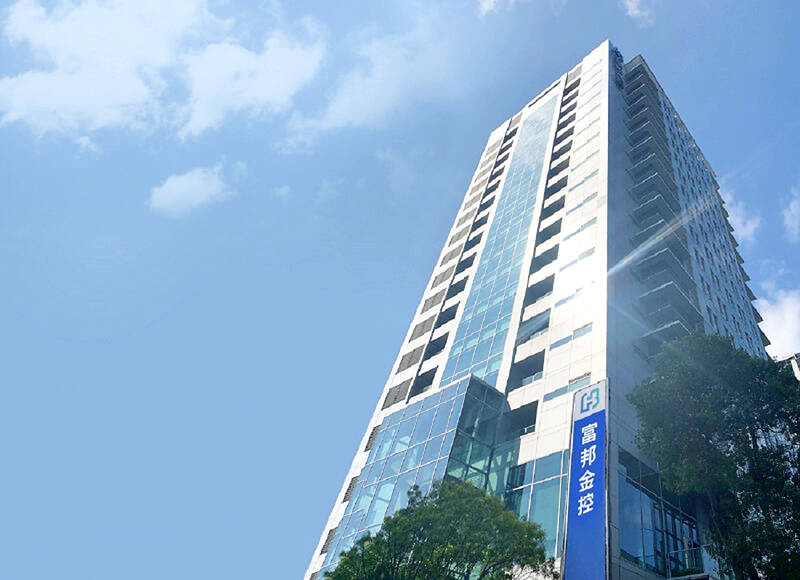Fubon Financial Holding Co (富邦金控) yesterday said it is eyeing profit growth this quarter and next year, despite rising uncertainty in the macro-operating environment as the specter of tariffs rises.
The Taipei-based conglomerate posted NT$121.31 billion (US$3.73 billion) in net income in the first three quarters of this year, or earnings per share (EPS) of NT$8.61, the best among local peers.
In the first 10 months, net income rose to NT$130.29 billion and EPS advanced to NT$9.27, Fubon Financial said, adding that the results represented the second-best on record for the period, with its major subsidiaries all contributing.

Photo courtesy of Fubon Financial Holding Co
“We expect the profit momentum to sustain this quarter and next year,” Fubon Financial president Jerry Harn (韓蔚廷) told an online investors’ conference.
The company is preparing its budget for next year and would supply more detailed guidance at the next earnings conference, he said.
Fubon Financial wouuld cautiously navigate the fast-changing global scene after US president-elect Donald Trump unveiled a tariffs policy that would have repercussions around the world, Harn said.
“It is too early to pass judgement on the Trump effect at this juncture ... but the incoming Trump administration would surely put his pledges into action,” Harn said.
Overall, financial markets would fare well next year, if the US Federal Reserve further lowers interest rates, spurring loan demand and lending support for private consumption, the company said.
Fubon Financial said that its banking unit, Taipei Fubon Bank (台北富邦銀行), reported record net income of NT$25.1 billion in the first three quarters, already surpassing last year’s total, thanks to increases in interest and fee income from advances in its wealth management, financial trading and credit card businesses.
The bank’s outstanding loans rose 10 percent in the first three quarters from the same period last year, with double-digit percentage increases in commercial and retail lending, Fubon Financial said.
It aims to moderately expand mortgage operations next year to people with investment needs, it said, adding that such loans are secure and promise higher interest rates.
Net interest margin would hold steady with a positive bias moving forward, in line with portfolio adjustments and despite the expected interest rate cuts, it said.
Fubon Financial’s insurance unit, Fubon Life Insurance Co (富邦人壽), reported NT$77.92 billion in net income in the first nine months, with its 15.6 percent gain in first-year premiums outperforming peers, the group said.
The insurance arm elevated its ratio of pay-in-installment policies to 58.1 percent, which is more healthy for long-term business, it said.
Stock market rallies in Taiwan and overseas prompted Fubon Life to extract its profit and bolster its investment returns, and the unit would seek to redeploy its funds when the opportunity arises, Fubon Financial said.
The group would set aside more money for cash dividends next year after considering its capital adequacy and business needs, it added.

Taiwan’s long-term economic competitiveness will hinge not only on national champions like Taiwan Semiconductor Manufacturing Co. (TSMC, 台積電) but also on the widespread adoption of artificial intelligence (AI) and other emerging technologies, a US-based scholar has said. At a lecture in Taipei on Tuesday, Jeffrey Ding, assistant professor of political science at the George Washington University and author of "Technology and the Rise of Great Powers," argued that historical experience shows that general-purpose technologies (GPTs) — such as electricity, computers and now AI — shape long-term economic advantages through their diffusion across the broader economy. "What really matters is not who pioneers

In a high-security Shenzhen laboratory, Chinese scientists have built what Washington has spent years trying to prevent: a prototype of a machine capable of producing the cutting-edge semiconductor chips that power artificial intelligence (AI), smartphones and weapons central to Western military dominance, Reuters has learned. Completed early this year and undergoing testing, the prototype fills nearly an entire factory floor. It was built by a team of former engineers from Dutch semiconductor giant ASML who reverse-engineered the company’s extreme ultraviolet lithography (EUV) machines, according to two people with knowledge of the project. EUV machines sit at the heart of a technological Cold

TAIWAN VALUE CHAIN: Foxtron is to fully own Luxgen following the transaction and it plans to launch a new electric model, the Foxtron Bria, in Taiwan next year Yulon Motor Co (裕隆汽車) yesterday said that its board of directors approved the disposal of its electric vehicle (EV) unit, Luxgen Motor Co (納智捷汽車), to Foxtron Vehicle Technologies Co (鴻華先進) for NT$787.6 million (US$24.98 million). Foxtron, a half-half joint venture between Yulon affiliate Hua-Chuang Automobile Information Technical Center Co (華創車電) and Hon Hai Precision Industry Co (鴻海精密), expects to wrap up the deal in the first quarter of next year. Foxtron would fully own Luxgen following the transaction, including five car distributing companies, outlets and all employees. The deal is subject to the approval of the Fair Trade Commission, Foxtron said. “Foxtron will be

INFLATION CONSIDERATION: The BOJ governor said that it would ‘keep making appropriate decisions’ and would adjust depending on the economy and prices The Bank of Japan (BOJ) yesterday raised its benchmark interest rate to the highest in 30 years and said more increases are in the pipeline if conditions allow, in a sign of growing conviction that it can attain the stable inflation target it has pursued for more than a decade. Bank of Japan Governor Kazuo Ueda’s policy board increased the rate by 0.2 percentage points to 0.75 percent, in a unanimous decision, the bank said in a statement. The central bank cited the rising likelihood of its economic outlook being realized. The rate change was expected by all 50 economists surveyed by Bloomberg. The